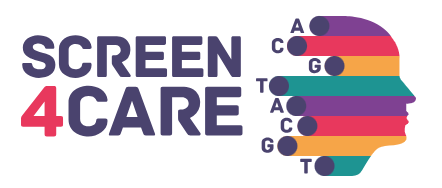 Ralitza Raycheva, Kostadin Kostadinov, Georgi Iskrov, Georgi Stefanov, Elena Mitova and Rumen Stefanov, as part of the Institute for Rare Diseases and the Department of Social Medicine and Public Health at the Medical University – Plovdiv, actively participate in the Screen4Care project, which started in 2021. Screen4Care offers an innovative research approach to accelerate rare disease diagnosis, which is based on two central pillars: genetic newborn screening and digital technologies.
Ralitza Raycheva, Kostadin Kostadinov, Georgi Iskrov, Georgi Stefanov, Elena Mitova and Rumen Stefanov, as part of the Institute for Rare Diseases and the Department of Social Medicine and Public Health at the Medical University – Plovdiv, actively participate in the Screen4Care project, which started in 2021. Screen4Care offers an innovative research approach to accelerate rare disease diagnosis, which is based on two central pillars: genetic newborn screening and digital technologies.
Current research study “Landscape analysis of available European data sources amenable for machine learning and recommendations on usability for rare diseases screening” has been executed by Georgi Iskrov, Ralitsa Raicheva, Kostadin Kostadinov, Georgi Stefanov, Elena Mitova and Rumen Stefanov from BAPES, Institute for Rare Diseases team together with Merja Vakevainen, Kaisa Elomaa, Yuen-Sum Man, Edith Gross, Jana Zschüntzsch, Richard Röttger and is published in the prestigious international journal “Orphanet Journal of Rare Diseases” (Impact factor: 3.7).
Patient registries and databases are pivotal tools in advancing clinical research for rare diseases, as well as in improving patient care and healthcare planning. This study aims to conduct a comprehensive analysis of available European data sources suitable for machine learning (ML) in rare diseases screening, with a focus on their adherence to the FAIR (findable, accessible, interoperable, reusable) principles, legal compliance, and business considerations.
Between March 2022 and December 2022, a cross-sectional study was conducted using a semi-structured questionnaire distributed to database contacts. Drawing from relevant scientific literature, quantitative and qualitative research, and scoping reviews, the questionnaire was designed to capture insights into challenges in mapping European rare disease databases. Bayesian models were employed to assess database characteristics associated with FAIR adherence, legal compliance, and business considerations.
Analysis of 330 unique replies revealed diverse database characteristics and geographical scopes. Notably, European registries exhibited the highest overall FAIR adherence, while registries with regional and “other” geographical scopes ranked lowest in FAIR adherence. Despite the majority of databases being active and established after 2000, there remains a significant reluctance among EU health databases to share patient information. This reluctance is often attributed to legal barriers and concerns about data privacy. Only a small proportion of respondents expressed a direct willingness to contribute their databases to initiatives like the Screen4Care project.
The most important results of this study demonstrate not enough sufficient FAIR principles adherence and low willingness of the EU health databases to share patient information, combined with some legislation incapacities, resulting in barriers to the secondary use of data. Read the full article here.
Screen4Care project has received funding from the Innovative Medicines Initiative 2 Joint Undertaking (JU) under Grant Agreement No. 101034427. The JU receives support from the European Union’s Horizon 2020 research and innovation programme and EFPIA.

